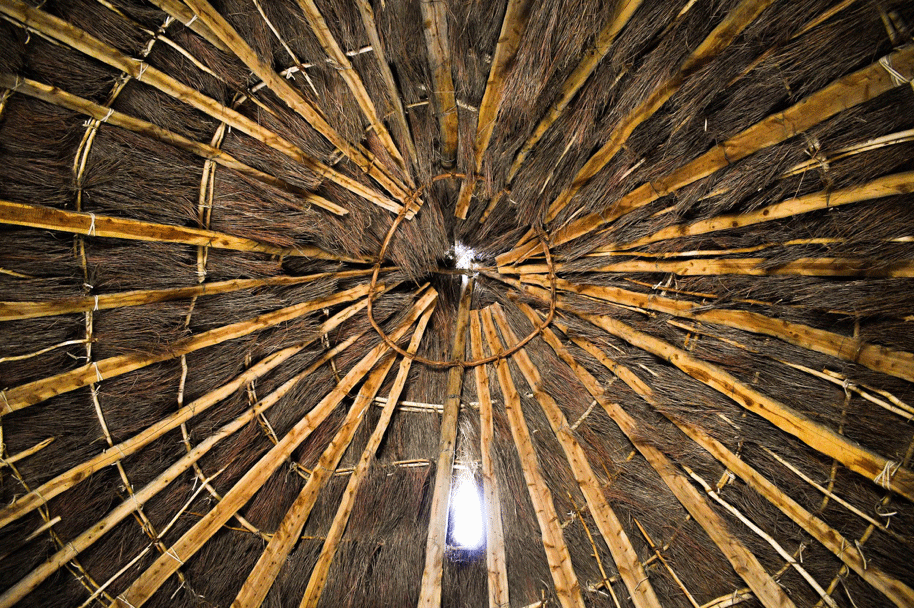Wichita and Affiliated Tribes:
Still looking far ahead
By Brooklyn Wayland
“When you're in this house, where we live, you’re Wichita, but when you step out those doors, you're just like everyone else.”
Anthony Galindo, a citizen of the Wichita and Affiliated Tribes with Delaware and Comanche descent, remembered the words of his grandparents that embody how he was raised and how he inevitably raised his children. His son Daryl Galindo, also a citizen of the Wichita and Affiliated Tribes sat next to him, prompting him every so often.
Anthony Galindo was born in 1961 and was left at the hospital. His mother had just gone through a nervous breakdown.
“My mother didn’t want me, which is hard to say, but at that time, they were adopting Indian children out (to non-Indian families) at an alarming rate, and my grandpa didn't want that for me,” he said.
Anthony Galindo was raised by his grandparents and said he was one of the last to grow up in a traditional Wichita home.
“They always looked far ahead as my people have done for years,” he said.
He can remember seeing his grandparents praying to the sun every morning, which is the gospel of the traditional tribal religion: Big Drum. They always spoke in their native language before echoing what they had said in English.
Anthony Galindo’s grandparents were educated at Riverside, where native languages were banned. He said his grandfather never overcome the trauma of being abused at the Indian boarding school. He never forgave.
Anthony Galindo’s first memory is his grandfather telling him that the government’s intent was to wipe Native Americans off the face of the earth. Just a young boy at the time, he didn’t fully understand. Looking far ahead, he would.
Now, at 58, Anthony Galindo said he can attest to the discrimination his grandfather experienced.
“I can remember the death of the Indian,” he said. While discrimination has changed, it is still present today. “I remember them spitting on us. It is hard to believe in America that it still goes on, but it does. It’s real subtle.”
The Wichita and Affiliated Tribes, headquartered in Anadarko, Oklahoma, encompasses the Wichita, Waco, Taovaya, Tawakoni and Kicha people who archaeologists believe are the direct descendants of the Plains Village cultures that spanned AD 800 to Ad 1500 in what is now the state of Oklahoma, said Gary McAdams, Wichita Tobacco Man and Cultural Program Planner.
“In the beginning, Creator, Kinnikasus, placed us here,” Daryl Galindo, Anthony’s son, said.
McAdams, who has studied tribal history for decades, recalled the Wichita people were living along the Arkansas River in what would become the states of Kansas and Oklahoma. Then, in 1855, the federal government assigned the Wichita reservation in Young County, Texas.
But soon the pressure from white settlers to obtain the Texas reservation land became too great, and they were moved to Oklahoma in 1859.
Then the Civil War broke out, and the Wichita people were forced in 1863 to move to Kansas. In 1867 they returned to what is now known as Oklahoma’s Indian Territory, but this time, they were riddled with disease and depleted in numbers, according to tribal historians.
Their native homeland welcomed them back. Their traditional ways, however, weren’t welcomed. Men couldn’t play the role they traditionally had in their culture. Allotment was just one of the many ploys to force out traditional tribal ways.
Each plot of land was divided among the individual members of the tribes which reduced the tribal land to a fraction of what it once was. These allotted lands even came with regulations designed to make it difficult for native people to keep their lands.
According to McAdams, when the federal government created the allotments and distributed the land among tribal members, it broke the Wichita people up, making it harder for them to have the communal style living they had for all of history.
It is on these allotments that Anthony Galindo was raised and learned of the history of the Wichita people, of Riverside and his grandparents’ hardships and of the death of the Indian. It is on these allotments alone that he can escape the hardship of what it means to be Native American in America today. It is on these allotments he can be himself, a Wichita, looking far ahead as his people have done for hundreds of years.
Brooklyn Wayland is a reporter with Gaylord News, a reporting project of the University of Oklahoma Gaylord College of Journalism and Mass Communication.







